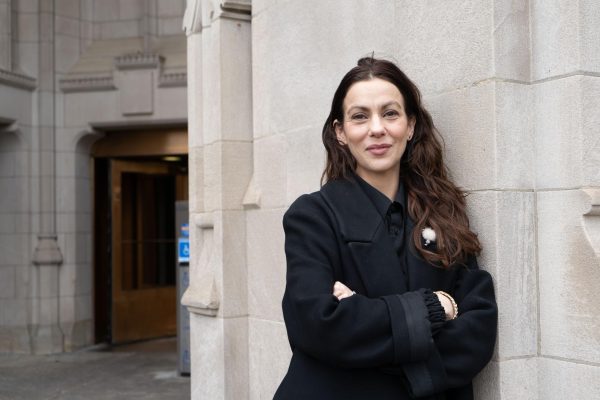To go to grad school or not to go to grad school… that is the question
September 12, 2018
Those in favor …
Brian Gentry, contributing editor
I’ve wanted to experience the college atmosphere since my first year of high school.
Not just the social aspects like the clubs and the parties and the friends — I love the idea of research, of inquiring about what we don’t know yet and testing the limits of what we can know. I love the idea of teaching — the act of getting someone to understand a concept.
This is strange coming from a mechanical engineering student like myself. Most mechanical engineering majors go into industry, working behind a desk reviewing plans, designing parts, performing simulations and completing other menial tasks. But I’m going to be a professor — it’s the only job that combines my love of research and teaching.
That’s why I need to go to graduate school. If I ever want to realize my dream of becoming a professor, I need to go through another five years of school, learning how to research and practicing my teaching.
I don’t know where I’ll go to graduate school. Of course, I have dreams of attending some of the top-ranked engineering schools, like Carnegie Mellon, Cornell or Georgia Tech. But I recognize that these are long shots — as long as I’m in a thriving city, I’ll be happy.
I don’t even know what I’ll go to graduate school to study. I’ve done coursework in mechanical engineering, research in chemistry, internships in environmental engineering and industry projects in applied math. I have a passion for all of these subjects and since STEM graduate degrees tend to be fully funded, I won’t have an issue paying for it.
What I do know is this — to satisfy my urge to contribute to the knowledge the world has access to and to fulfill my desire to help the next generation of students learn how to think, I need to get a doctorate. Though the long nights and caffeine addictions of undergrad are already draining, grad school is in my future.

Sylvia Freeman | Staff Illustrator
Delilah Bourque, staff columnist
Since I first came to Pitt in 2016, I have planned on going to some form of grad school —
even though I’m still not entirely sure what I’ll study.
As a general biological sciences major, I’ve always felt like grad school is my destiny. Getting a graduate degree will help me get the research science-based career I yearn for, either in an academic setting or in industry. After coming to Pitt and listening to the tales of graduate students in STEM, I’ve come to acknowledge students pursuing STEM degrees are much more likely and much more encouraged to attend grad school.
Aside from professional schooling — such as law school or med school — it seems generally easier for a STEM student to get a graduate degree. Most programs for human genetics or pharmaceutical design, the two fields I’m most interested in, are six- to eight-year-long programs, in which you earn both a master’s and a doctorate. In most of these programs, the cost of tuition is absorbed by a faculty member overseeing your research and the school gives students a living stipend to live near and work with the university.
As a postdoctoral fellow once told me, “Don’t get a degree in science unless they’re paying you.”
This is a far cry from even a master’s degree program in a related field. The path seems to be laid out for people like me, who want and need a post-bachelor education. Why pay for a degree you could get paid to complete? For me, graduate school is a clear choice.

Eli Savage | Staff Illustrator
Joshua Jordan, for The Pitt News
The journey to my decision to major in architectural studies was not an easy one — and my decision to go to graduate school even less so.
I actually arrived to Pitt three years ago with the intention of becoming a physical therapist but quickly realized that understanding the intricate inner workings of the human body was not a task I was up to. After several major changes — trying everything from psychology to marketing to history — I decided to try my hand at architecture. Being a creative type with an appreciation for design that’s both well-built and aesthetically pleasing, the switch seemed to make sense for me. It was the right decision — I love my program.
With my undergraduate career halfway over already, I’m constantly thinking about my future. My ideal path would entail becoming a licensed and practicing architect. But in order to do this, I would have to go to a National Architectural Accrediting Board-certified grad school and earn a master’s degree in architecture.
Graduate-level architecture programs are extremely competitive. They can also take anywhere from two to three years to complete and can cost upwards of $50,000 a year in tuition alone. Considering these factors, I sometimes find myself asking if grad school truly makes sense for me.
While my feelings about attending grad school are mixed, I am definitely still looking forward to my proseminar for undergraduate architecture students. The course is designed to educate students on our various options upon finishing our undergrad, including paths that do not require attending a graduate program.
So while at the moment I do plan to advance beyond a bachelor’s, if choosing a major has taught me anything, it’s that the future is always subject to change.
Those against…

Eli Savage | Staff Illustrator
Neena Hagen, assistant opinions editor
“Mommy, I wanna get out of here!” I cried as my teacher dragged me into the school building for my first day of kindergarten. Fourteen years later and my sentiments about school remain remarkably similar — in fact, I still repeat that same phrase to myself as I walk to class every day.
Growing up in an Indian family, culture dictates that obtaining a doctorate is the highest possible life achievement, and it’s hard not to get sucked into that same mentality. But I’ve always found private-sector jobs a lot more enticing — going through several years of graduate school and ultimately living a life bound to academia just isn’t for me.
As an actuarial math major — a very niche field that blends statistics and insurance — it makes sense for me to avoid grad school. Most advanced degrees either lead to a professorship, which usually means a lifelong career in academia, or prepare graduates for a specific profession, which I’m already bound for with my undergraduate degree.
Going to grad school may make sense for lawyers and medical professionals who need law school or medical school to find footing in their professions, but for the remainder of students it’s not always a sound decision.
Since the average grad student pays 77 percent of their tuition by themselves — on top of the nontrivial $16,500 per year for undergraduate school — students would benefit financially from declaring a specific, career-focused major in college rather than scrambling their senior year to earn tens of thousands of dollars for grad school.
For me, the decision is clear — finish college, then avoid academia at all costs.

Sylvia Freeman | Staff Illustrator
Maggie Koontz, senior columnist
After I tell someone what my majors are — English nonfiction writing and German language and cultural studies — they either ask me what I plan to do with them or they ask me if I’m going to graduate school.
This has been happening for a little over two years now. For the former question, I would always wave my hand and say something vague — but for the latter, I would say no without a second thought. That is, until recently.
Honestly, I hadn’t given grad school that much thought. For my majors, I would only go to graduate school if I wanted to pursue my doctorate in German or if I wanted to get my MFA. But German is more of a hobby for me, and although writing is my main career goal, I had only recently — and loosely — considered going to graduate school to get my master’s.
But as I dove into the world of writing, a long-forgotten career goal floated to the surface of my mind and I remembered that as a child, I wanted to be a librarian. So I began researching this fancy of mine and talking to the librarians at Pitt. Suddenly, this was a very real possibility. I can go to graduate school to be a librarian, and I absolutely will — just not right after my time as an undergraduate.
Grad school is expensive, so I plan on taking some time after I graduate from Pitt in the spring. I’ll probably try copy editing, translating or work for a publishing company. That way, not only can I save up my money, but I can also test the waters in the job market to make sure my mind is made up before I decide to fully commit. Who knows? I might decide not to go, but for now, that’s the plan.
For me, my career just happened to bring me to the idea of grad school, but I wouldn’t be disappointed if I changed my mind. I believe that humanities majors have a lot more freedom to navigate the job world and that they don’t necessarily need grad school, but they should go if they have a desperate desire to go farther in their field.

Eli Savage | Staff Illustrator
Maggie Durwald, Opinions Editor
I’ve always thought I’d go to grad school. My mom got her master’s degree, so I figured I should, too. After all, we’re supposed to do as well as our parents — if not better.
As a linguistics and French major, the next logical step is grad school, with the ultimate goal of a doctorate. But now I’m not so sure that’s what I want.
College is exhausting. For me, there’s nothing more thrilling than learning, but in many ways school — even at the collegiate level — isn’t just about the act of learning for the sake of knowledge. It’s about learning to take the test, to pass the course, to fulfill major requirements, to graduate in four years with a degree. A large part of me is wary of signing up for another two years of that.
Besides the toll grad school takes on a person’s energy, it’s also incredibly expensive. There are grants and scholarships to apply to, but about 60 percent of grad students don’t receive that kind of funding at all. After four years of paying tuition and fees, the idea of taking on more debt does not appeal to me in the slightest.
And since I’m so skittish when it comes to the idea of grad school, I don’t think I’ll dive into it just yet because I think it’s the next right step. Instead, I think I’ll try teaching English as a foreign language abroad, translating, interpreting or maybe copy editing. Wherever I end up in a couple years, I know I’ll have several options.
I might return to the idea of grad school someday when I know exactly what I want to do. But until then, I plan on avoiding what could be a costly mistake.

Sylvia Freeman | Staff Illustrator







